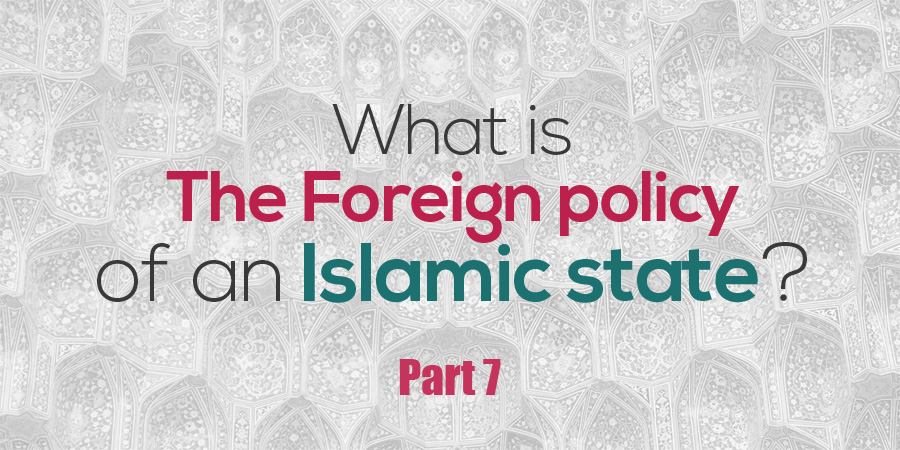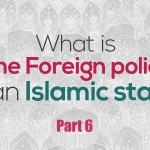What is the Foreign Policy of an Islamic State? (7)
 The Relations of the Islamic State with the Powers Ruling over Muslims
The Relations of the Islamic State with the Powers Ruling over Muslims
What policy has the Islamic government to adopt vis-à-vis the governments which rule over a considerable number of Muslims? Should it be on a par with the policy in relation to other non‑Muslim countries, or a different policy is to be adopted toward such States? Of course, all the States where Muslims live are not alike, and they can be divided into different categories:
First Category: A state’s government is one hundred per cent Islamic if it has firm faith in the Islamic system and fully implements it in all of its dimensions.
Second Category: Those States which accept the Islamic faith in general, but which do not recognize fully the implications of the Islamic faith. In application, they confine Islam to the matters pertaining to the fundamental doctrines of the faith, prescribed forms of worship and some parts of Islamic ethics.
They do not understand Islam as a comprehensive system that covers not only the matters of worship but also all the moral, political, and social aspects of human life. Such a government does not Islamize its governmental and social institutions, not because of any hostility but due to sheer ignorance.
Third Category: The States which claim to be Muslim but do not have any objective except remaining in power and ruling over Muslims under this pretext. All that matters to its officials is position, authority, and luxuries of life; they do not care for Islam or for anything else, and are not interested in following the teachings and laws of Islam.
Fourth Category: A government which is not only uncommitted to Islam, but is also installed in power by unbelieving and oppressive powers, receives their support, and acts as a puppet in the hands of oppressors and enemies of Islam.
In view of the above‑mentioned categories, the foreign policy of an Islamic State cannot be uniform with respect to various States and governments. The Islamic government is committed to a particular ideology and certain and specific aims, hence it has to choose the best policy which can be instrumental in reaching nearest to its goals in the best possible manner. An Islamic government is obliged to fulfill its commitments to all Muslims of the world. Such commitments are enumerated in brief
(1) It should make all efforts to awaken Muslims of the world and to arm them with the teachings, culture, and values of Islam.
(2) It should strive to create an atmosphere of cordiality, fraternity, and mutual understanding conducive to Islamic unity.
(3) It should try its best to eliminate from the Muslim countries all forms of influence and intervention of the unbelievers and the imperialists.
(4) An all‑out effort for achieving complete independence and freedom of the Muslim Ummah.
(5) An attempt to establish Islamic rule and to implement Islamic laws all over the world.
(6) Defence of the oppressed and the exploited people and enforcement of social justice throughout the whole world.
(7) War against unbelief, materialism, and imperialism with a view to spreading tawhid and Islam in the world.
Such is the scope of the responsibility of an Islamic government whose fulfillment is an extremely delicate and difficult task. The authorities of the Islamic State should frame their external affairs policies, keeping in view the targets mentioned above, in such a fashion that they are able to reach their objectives sooner and with efficiency.
Naturally no uniform policy in relation to all the various States and governments can be adopted, for all of them are different from one another in many respects. In accordance with each country’s pattern of government, and cultural traditions; the military, economic and political potentialities, of the Islamic State; different policies have to be pursued in the context of the general conditions and the historical course of the world events.
It is important that the desired goal ought never to be let to slip out of our mind, and every possible opportunity and means accessible to us are to be tried for attaining it.
In some cases breaking of relations is the best policy, while in other cases complete mutual cooperation is required. Occasionally war is the best way of solving the problems, and sometimes truce is essential. It is up to the authorities of an Islamic government to decide which policy and what way can be adopted. We can only suggest briefly that, in general, maintaining good relations with certain countries is advantageous in some respects, as follows:
(1) A spirit of mutual understanding in relation to various States can provide better opportunities for establishing contacts with the people and for propagating the teachings and principles of Islam in order to awaken Muslims and acquaint them with the realities of Islam so that proper ground is prepared for implementation of the Islamic social system and its laws.
(2) Good relations with friendly States are conducive to seeking their support and cooperation in the international organizations and forums in order to advance the interests of Islam.
(3) Good relations are more conducive to attainment of the desired goal of Islamic unity and liberation of nations from the clutches of the infidel imperialist powers. As the unbelievers and exploiters make attempt to sow the seeds of disunity among the Muslim countries in order to protect their own interests, breakdown of relations among Muslim States serves their purpose and is desired by them.
Without harming the main objectives, if good relations with other Muslim countries are maintained and attempts are made to bring them closer, it would bring us closer to our goal. To whatever degree an Islamic State comes closer to other States, to the same extent they move away from the imperialist exploitative powers.
(4) If the Islamic State breaks its relations with some State, that State is forced to have closer alliance with the infidel imperialist powers for its own safety, with the probability that it shall fall totally into the hands of those powers. This would certainly damage the global cause of Islam.
(5) Relations of the Islamic State with such countries as mentioned above would be to the common benefit of the related nations from economic, cultural, and political points of view.
(6) Friendly relations can provide a safeguard against the hostility and conspiracy of other powers, or at least such relations can reduce the possibilities of opposition.
(7) The Islamic State, by maintaining friendly relations and promoting mutual understanding with all the Muslim countries, can meet its economic, cultural, scientific and military needs, and come closer to attaining self‑sufficiency. In the same proportion it would lead the Muslim countries to reduce their dependence upon oppressive world powers, and thus would inflict a severe blow upon the forces of exploitation.
Nevertheless, all this depends upon the Islamic State’s commitment to the message and goals of Islam, which should always be kept in sight, and all our attempts must be directed towards their realization. The course of action for attaining those objectives cannot always be one and the same; it would differ according to conditions and circumstances.
The choice of the best course is a highly difficult, critical, and sensitive affair, and even a minor lapse can result in un amendable consequences, weakening the power and prestige of the Islamic State.
Howsoever difficult and crucial the choice of policy for conducting foreign affairs and international relations may be, it is the responsibility of the officials of the Islamic State to adopt the best course with extreme care, acute insight, and faultless anticipation, in accordance with the existing conditions, in general, and the general criteria laid down by Islam in particular.
It is in this framework that sometimes a situation may arise in which breaking of relations with certain States, and even covert or open war against them is necessitated.
Written by Ibrahim Amini


